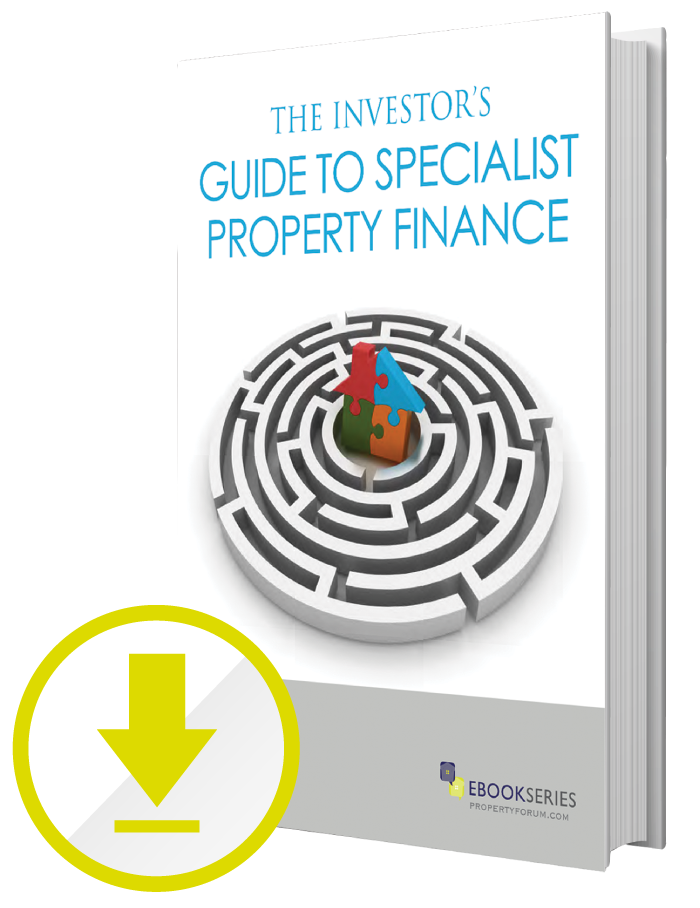Understanding your Property Finance options; Bridging Finance, Development Finance, Mortgages and more.
Getting the right property finance in place is vital to allow you to build and grow a successful property investment portfolio. Whether you are developing property or buying a holiday let, there is a specialist type of finance product to help you progress. Our Property Finance ebook uses real life case studies to help you understand all your property finance options.
Property Finance ebook download

Chat in our Property Finance forum!
We have a forum dedicated to the topic of Property Finance. It’s the perfect place to ask any questions you might have about development finance, bridging finance, specialist mortgages (buy-to-let, hmos and holiday let) and more. We have over 65,000 members including finance professionals, who are on hand to offer advice and tips on all things property finance.
Whether you are a first-time property investor, an experienced investor or, even, a landlord for an extensive portfolio of rentals, there will always be a choice when it comes down to financial help.
The financial option you choose is vital in ensuring your property investment’s success. From bridging loans to specialist mortgages, read our guide on the different property finance options and what assets they suit best.
Bridging Loans
Bridging loans are a popular choice when someone is looking to ‘bridge the gap’ when buying a new home before selling their existing one, as money is loaned over short time-frames and with interest-only. However, it is also possible to take out a bridging loan when you are investing in a property that you are buying at auction.
Property auctions require a buyer to pay a 10% deposit to secure the deal on the day. Then the remaining 90% is owed within 28 days. A bridging loan can be agreed in relatively short notice and, therefore, provides the investor with the money immediately allowing them to go ahead with the auction purchase.
Different Types of Bridging Loans
Bridging loans fall under two categories: ‘open’ and ‘closed,’ concerning their terms and conditions.
‘Open’ and ‘Closed’ Bridging Loans
‘Open’ bridging loans are agreed with no fixed repayment date; however, it is usually expected that the loan is repaid within one year. Whereas, on the other hand, a ‘closed’ bridging loan comes with a fixed date. These are common where there has been an exchange of contracts, but the property sale is still being completed.
To have a successful bridging loan application, a lender will require evidence of a clear repayment strategy. Typically, this would be proven using the equity of a property sale but can be shown by taking out a mortgage. Most lenders will also ask for evidence of the property you are purchasing too, to prove you have an ‘exit strategy.’
Regulated Bridging Loans
Another way bridging loans are categorised, is based on who is going to live in the property. Regulated bridging loans are issued in instances where you, or members of your family, are going to live in the property. Their regulation is similar to that of standard mortgage agreements.
Unregulated Bridging Loans
For corporate entities, individuals with specific circumstances, and properties where the buyer will not be the resident, unregulated bridging loans are issued.
Case Study:
In a recent example, a developer avoided an expensive predicament by taking out a bridging loan. For this developer, they had already negotiated a short-term loan with one lender to help them finance a development project for six properties. But, the work was taking longer than initially expected.
The loaned amount came to £1,006,520 at a rate of 0.95% per month, making the overall LTV (Loan-to-Value ratio) 50%.
The situation soon escalated when the original loan was about to run out in a fortnight. The original lender was looking to charge penalty fees that would have wiped out his entire profit margin. Unfortunately, extending his initial loan wasn’t an option, as extension fees would have been added to the penalty fees.
Another loan on very similar terms to the original and the developer would be ok. Fortunately, a specialist finance broker was able to refinance the loan with another lender within the fortnight time-span. With the commercials stacked up and the ‘exit strategy’ evidenced, the money was loaned; allowing the developer to pay off the original loan without having to cover any of the additional fees.
For more information on bridging loans, download our free ebook on specialist property finance.
Mortgages are a popular option for investors as they allow you to buy a property by only having to pay approximately 25% of its sales price. This 25% then acts as your deposit and represents your equity in the property. The rest of the mortgage is the debt that you owe back to the lender.
The standard mortgage term is around 25 years; however, they can last from as little as ten years up to 30 years. Within this time, you could see your property price increase, which in turn increases your equity and not your debt. However, the flip side can cause your property to be in negative equity.
How will you use your property investment?
Each lender will have their unique criteria that will determine whether or not they will give someone a mortgage. Some lenders are more demanding than others, but the essential circumstances are that the property is habitable, it is of ‘standard construction,’ and the loan will run for at least two years.
It is crucial that you know, in advance, how you want to use the property. Once you have decided whether you want your investment to be a buy-to-let, a holiday home, or an HMO (House in Multiple Occupation), you can consider the most suitable specialist mortgage.
It is important to note, if you take the wrong mortgage option and the lender finds out, they are entirely within their rights to demand immediate repayment and refuse any further mortgage applications from you. To avoid this, seek advice from a financial adviser and thoroughly plan out how you want to use your property.
Benefits of Specialist Mortgages
Specialist mortgages have slightly different terms and conditions as, in most instances, investors already have a mortgage on their first home. A specialist option, therefore, not only takes into consideration the type of investment the money is being used for, but also that most people are already managing one monthly mortgage payment.
Different types of Specialist Mortgages:
Buy-to-Let Mortgages
Buy-to-let mortgages are used by anyone to fund the purchase or development of a property that they intend to rent out. The monthly mortgage payments are then met by the rent charged to the property’s tenants.
How they differ from a Standard Mortgage
Compared to standard mortgage options, buy-to-let mortgages are more specialist; and, consequently, have some key differences. For example, a buy-to-let mortgage will come with higher interest rates and will require a larger deposit. There are also additional fees involved when taking out a mortgage for a prospective buy-to-let property, as well as more calculations that take the rental coverage into account.
With buy-to-let mortgages, it is vital that your rental income comfortably covers your monthly mortgage repayments. Remember, your property may be left standing empty for some months, will you be able to meet your mortgage costs?
Lenders do account for these barren months by checking the ‘rental coverage ratio.’ This ratio calculated whether the borrower has a buffer to cover the vacant months. On average, this should be between 125% and 145% of the mortgage payment. These figures are then ‘stress tested’ at a 5% interest rate.
For more detailed information regarding the ‘rental coverage ratio,’ check out pages 4-8 in our ebook — this is available for free download on our website.
A holiday let mortgage is designed for investors looking to borrow money to buy a house to let out to tourists specifically. These mortgages are not to be confused with second home mortgages, where the money borrowed is being used to buy a second home that only you will use.
Although they sound similar to buy-to-let mortgages, there is a key difference. Holiday let mortgages are arranged on the condition that the property will only be let out for short durations for holidaymakers; whereas, there is no limit on the duration of the rental agreement with buy-to-let mortgages.
It is worth stating again; you must decide how you will use your property investment before applying for a mortgage. If you take out the wrong mortgage, a lender has the right to demand immediate repayment of the loaned amount.
With HMO mortgages, a lender will accept an HMO as security against the loaned amount. For a property to classify as an HMOin England and Wales, it must be let to three or more tenants from more than one household. If a property is let out to five or more, it is considered a ‘large’ HMO. Where these HMOs are concerned, licenses and inspections must be carried out by the relevant local council officials.
Due to the specialist nature of HMOs, applying for a mortgage for one can be more complicated and more expensive.
What to expect with HMO Mortgages
Most mortgage lenders will assess the potential rental income of the property as if it was being let out as a family unit when considering the borrowers ‘exit strategy.’ Moreover, mortgage fees will generally be more expensive as a lender will carry out a specialist valuation process to determine these figures.
Development finance is another loan that can be used for the development or refurbishment of residential, commercial, or mixed-use properties. And, can also include single-unit projects as well as larger multi-unit schemes.
Development finance is one of the only financial options that takes into consideration the possible value of the property, once it has been developed. They are more commonly given to experienced property developers and builders, with a track record of their expertise, as development finance lenders base the terms of the loan on the Gross Development Value (GDV).
The lender begins by funding only a percentage of the purchase cost; then the development finance is arranged to cover 100% of the construction costs, professional fees and interest. It is funded in tranches that a developer/builder can draw upon when certain milestones are achieved in the development project. These loans last anything from six months to two years.
It is possible to apply for specialist financial help through a specialist intermediary or master broker; however, it is crucial to do your research first. Choose an advisor who has a solid reputation that is backed up by years of experience dealing with specialist lenders. Some of the options that have been discussed are not commonly found on the high street. Without inside knowledge, navigating the market can be difficult.
A specialist broker should be an expert in these finance models and can easily guide you through each process, advising on the best property finance option for your needs. Here at Property Forum, we work with a highly recommended and specialist finance broker in the UK. If you would like more advice about any of the options above, visit our website to book a call with our recommended broker.
BOOK A CALL WITH OUR RECOMMENDED PROPERTY FINANCE BROKER NOW >
Speak to a finance expert
Property Forum has worked with a leading specialist UK property finance broker for several years. Get access to this leading team by filling in your details on this form and they will be in touch to answer your questions.
- Do you need an HMO, Holiday Let or other specialist mortgage?
- Do you need Bridging Finance to buy your next investment property?
- Do you need technical help on the different types of property finance available?
- Do you need Property Development finance to build your dream home?
- Are you struggling to be accepted for Property Finance on the high street?
- Do you want to release build a large buy-to-let portfolio and need the right Property Finance in place?
Watch almost 2 hours of specialist property finance guidance...
Most people who live in an HMO enjoy the communal aspect of living and you can make some great friends this way, as well as paying lower living costs than you would renting alone. In general, as there are more people in an HMO property, wear and tear can be more intense and so repairs and replacements may be required more often.
Read the latest news articles on Property Finance...
Fast track your property investment success with an expert Mentorship...
Most people who live in an HMO enjoy the communal aspect of living and you can make some great friends this way, as well as paying lower living costs than you would renting alone. In general, as there are more people in an HMO property, wear and tear can be more intense and so repairs and replacements may be required more often.
Learn more about other property investment strategies...

Holiday Lets, Air BNB and buying overseas
Lorem ipsum dolor sit amet, consectetur adipiscing elit. Ut elit tellus, luctus nec ullamcorper mattis, pulvinar dapibus leo.

Lease options and rent to rent investments
Lorem ipsum dolor sit amet, consectetur adipiscing elit. Ut elit tellus, luctus nec ullamcorper mattis, pulvinar dapibus leo.

Property development, auctions and land
Lorem ipsum dolor sit amet, consectetur adipiscing elit. Ut elit tellus, luctus nec ullamcorper mattis, pulvinar dapibus leo.

